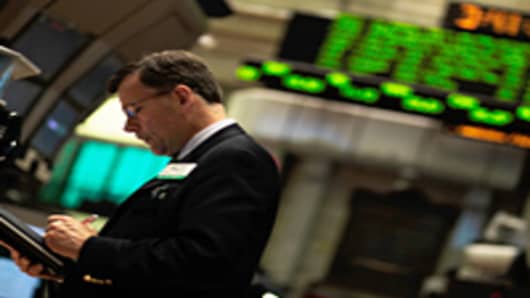Merger talks between NYSE Euronext and Deutsche Boerse follow a series of trans-Atlantic exchange hookups and beg the question of when one of the new exchange super powers will reach across the Pacific to become truly global with a big Asian partner.
It is also seen as the survival of the fittest in a world of increasingly splintered trading venues, and the super exchange model puts pressure on others to find partners. CME , Nasdaq OMX , and CBOE all saw their shares rise on the speculation they would be looking to merge.
"The question is whether Asia is going to consolidate, or are you going to see a big global exchange. That's probably the biggest future question," said Sandler O'Neill analyst Richard Repetto. He said while the NYSE has its previous Euronext deal and Nasdaq had its OMX deal with Nordic exchanges, there has been no big global deal with Tokyo, Singapore or Hong Kong exchanges. Asia is seen as the hottest growth area for exchanges.
"You can safely say this puts (the combined NYSE-Deutsche) in a much better position because of the scale of the business and the cash available. It will be a global leader looking eastward," said a source familiar with the situation. The source said there are no active discussions on Asian deals, but it would be a likely future step.
"The question is whether Asia is going to consolidate, or are you going to see a big global exchange."
The revelation that talks were underway between NYSE and Deutsche Boerse came Wednesday, not long after news of an agreed merger between Toronto's TMX and the LSE. The NYSE-Deutsche combination would create the world's largest stock and derivatives exchange, with the TMX-LSE combination the second biggest.
The two had been in talks previously, but discussions heated up in the past two weeks. A deal is said to be close and could be announced Tuesday.
Sources say the Deutsche Boerse would exchange its shares for NYSE shares at an implied premium of 10 percent. The combined entity would have a $20 billion plus market cap, and under the discussed deal structure Deutsche Boerse would be the acquirer.
The transaction is also seen as a defensive move, as the NYSE continues to suffer a decline in volume as investors trade else where.
"They lost a lot of volume to off exchange trading," said Bob Browne, Northern Trust Global Investments CIO, who acknowledged that his firm increasingly trades off exchange. "What happens when you start to lose market share is you have to find increased scale and focus on costs."
A source familiar with the NYSE talks acknowledges that exchange costs are much higher than the upstart rivals, and the combination will help save money. Much of $300 million in cost savings comes from technology synergy. "There are a lot of competing exchange models. it's a fact of the matter they require little regulatory infrastructure," said the source.
NYSE CEO Duncan Niederauer would be CEO of the combined company which would have dual headquarters in New York and Frankfurt. Deutsche CEO Reto Francioni would become chairman.
The source does not anticipate regulatory issues though analysts expect European regulators to have more concerns than U.S. regulators. "On the regulatory side the big overlaps where they combine and get bigger are the futures in European and the cash equities in Europe, and in the U.S. it's the U.S. options. Other than that there's other businesses they don't overlap," said Repetto.
Alasdair Haynes, CEO of Chi-X Europe—one of the pan-European exchanges that's turning up the heat on NYSE Euronext —also does not see insurmountable regulatory problems for the NYSE-Deutsche deal. He said there is no great overlap on the cash side of the businesses and he does not see competition authorities automatically objecting to the deal if trading costs are driven lower.
One area the combined company may have to make concessions on is clearing and settlement, where the new group will be dominant, Haynes said.
The proposed business structure also raises questions about how U.S. politicians will react to a major icon of American capitalism being arguably run by German hands. One source said the deal was being discussed with regulators and Congressional leaders.
"We're doing a deal that puts New York at the vanguard of creating a new business model for global growth," said the source. "What would they have us do? Hook up with the CME and become New York versus Chicago? This is the New York Stock Exchange doing what it's always done, which is innovating, being a global pioneer."
Questions? Comments? Email us at marketinsider@cnbc.com



